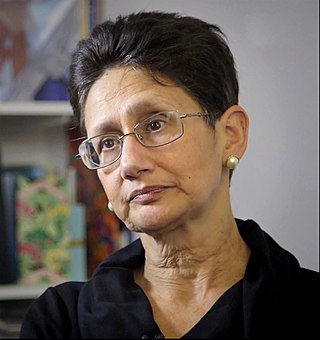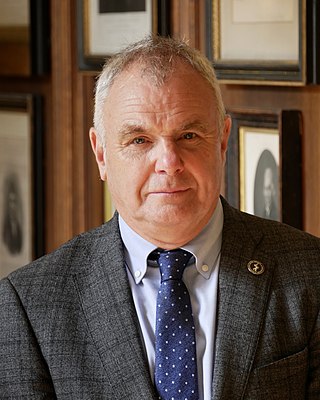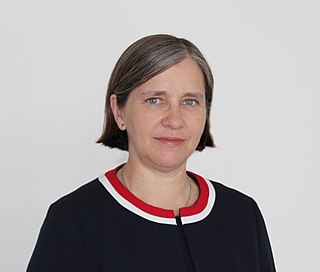
The Department of Health and Social Care (DHSC) is a ministerial department of the Government of the United Kingdom. It is responsible for government policy on health and adult social care matters in England, along with a few elements of the same matters which are not otherwise devolved to the Scottish Government, Welsh Government or Northern Ireland Executive. It oversees the English National Health Service (NHS). The department is led by the Secretary of State for Health and Social Care with three ministers of state and three parliamentary under-secretaries of state.

The Medical Research Council (MRC) is responsible for co-coordinating and funding medical research in the United Kingdom. It is part of United Kingdom Research and Innovation (UKRI), which came into operation 1 April 2018, and brings together the UK's seven research councils, Innovate UK and Research England. UK Research and Innovation is answerable to, although politically independent from, the Department for Business, Energy and Industrial Strategy.
The Health and Social Care Select Committee is a Departmental Select Committee of the British House of Commons, the lower house of the United Kingdom Parliament. Its remit is to examine the policy, administration and expenditure of the Department of Health and Social Care (DHSC) and its associated agencies and public bodies. The Clerks of the Committee are Previn Desai and Joanna Dodd.
Health in the United Kingdom refers to the overall health of the population of the United Kingdom. This includes overall trends such as life expectancy and mortality rates, mental health of the population and the suicide rate, smoking rates, alcohol consumption, prevalence of diseases within the population and obesity in the United Kingdom. Three of these – smoking rates, alcohol consumption and obesity – were above the OECD average in 2015.

Dame Anne Marie Rafferty FRCN is a British nurse, academic and researcher. She is professor of nursing policy and former dean of the Florence Nightingale Faculty of Nursing, Midwifery and Palliative Care at King's College London. She served as President of the Royal College of Nursing from 2019 to 2021.
The National Institute for Health and Care Research (NIHR) is the British government's major funder of clinical, public health, social care and translational research. With a budget of over £1.2 billion in 2020–21, its mission is to "improve the health and wealth of the nation through research". The NIHR was established in 2006 under the government's Best Research for Best Health strategy, and is funded by the Department of Health and Social Care. As a research funder and research partner of the NHS, public health and social care, the NIHR complements the work of the Medical Research Council. NIHR focuses on translational research, clinical research and applied health and social care research.

Neena Modi is a British physician and Professor of Neonatal medicine at Imperial College London. She is the current president of the UK Medical Women’s Federation, and past president of the Royal College of Paediatrics and Child Health, serving in this role from April 2015 to April 2018. She is one of only four women to ever hold this position.

Derek Bell was Professor of Acute Medicine at Imperial College London and continues to be an emeritus Professor. He has been a Consultant Physician at Central Middles Hospital, The Royal Infirmary of Edinburgh and most recently at Chelsea and Westminster Hospital NHS Foundation Trust. Appointed as the joint chair of two NHS Trusts in 2021. His initial leadership saw him and others receive parliamentary criticism. Professor Bell was the director of the National Institute for Health Research (NIHR) CLAHRC for Northwest London. He was President of the Royal College of Physicians of Edinburgh, elected in November 2013 he took office on 1 March 2014 succeeding Neil Dewhurst. He was re-elected for a second term on 24 November 2016. He was awarded an OBE in the 2018 New Year Honours for services to Unscheduled Care and Quality Improvement.
Sharon Jayne Peacock is a British microbiologist who is Professor of Public Health and Microbiology in the Department of Medicine at the University of Cambridge. Peacock also sits on Cambridge University Council.
Professor Graham Cooke is a clinician scientist and NIHR Professor of Infectious Diseases at the Wright-Fleming Institute of Imperial College London. He is best known for his work on viral hepatitis, particularly hepatitis C.
Elizabeth Murray was a British general practitioner and professor of e-health and primary care at University College London. In 2003 she established the eHealth Unit at UCL where she was co-director, and she was also Deputy Director of the UCL Institute of Healthcare Engineering.

Christina Pagel is a German-British mathematician and professor of operational research at University College London (UCL) within UCL's Clinical Operational Research Unit (CORU), which applies operational research, data analysis and mathematical modelling to topics in healthcare. She was Director of UCL CORU from 2017 to 2022 and is currently Vice President of the UK Operational Research Society. She also co-leads, alongside Rebecca Shipley, UCL's CHIMERA research hub which analyses data from critically ill hospital patients.
Azeem Majeed is a Professor and Head of the Department of Primary Care & Public Health at Imperial College, London, as well as a general practitioner in South London and a consultant in public health. In the most recent UK University Research Excellence Framework results, Imperial College London was the highest ranked university in the UK for the quality of research in the “Public Health, Health Services and Primary Care” unit of assessment.
Sonia Saxena FRCGP is a British physician who is a Professor of Primary care and Director of the Child Health Unit at the School of Public Health, Imperial College London. She is a Fellow of the Royal College of General Practitioners and a practises as a GP in Putney, London. She is known for her work in improving healthcare, and a focus on improving child health in the early years of life and reducing social inequalities.
The Institute of Global Health Innovation is one of Imperial College London’s global challenge Institutes. Established in 2010, its mission is to improve global health and care through evidence-based innovation. The Institute’s work aims to support the identification, development and implementation of healthcare innovation, with the goal of sustainably reducing inequalities in global health.
Kamlesh Khunti is a British physician who is Professor of Primary Care Diabetes and Vascular Medicine at the University of Leicester. His research considers diabetes and public health. During the COVID-19 pandemic, Khunti studied the impact of COVID-19 on people living with diabetes. He served on the Scientific Advisory Group for Emergencies (SAGE). He is the director of the National Institute for Health and Care Research (NIHR) Applied Research Collaboration East Midlands.
Waljit Dhillo is an endocrinologist and a Professor of Endocrinology & Metabolism at the Imperial College London. He is the Director of Research at the Division of Medicine & Integrated Care at Imperial College Healthcare NHS Trust and the Dean of the National Institute for Health and Care Research (NIHR) Academy. His research focuses on how the endocrine system controls body weight and reproductive functions.
Rachel Louise Batterham is a British physician who is a professor of Obesity, Diabetes and Endocrinology at University College London. She established the University College London Hospitals NHS Foundation Trust Bariatric Centre for Weight Management and Metabolic Surgery. She has extensively studied obesity, and has contributed to clinical management and the understanding of obesity-related diseases.

Lucy Chappell is a British professor of obstetrics at King’s College London and the Chief Scientific Adviser (CSA) for the UK Department of Health and Social Care. As part of her CSA role, she oversees the National Institute for Health and Care Research (NIHR) as Chief Executive Officer. Her research areas include medical problems during pregnancy such as pre-eclampsia, and the safety of medicines in pregnancy.
Ashley Adamson is a British dietician, Professor of Public Health Nutrition at Newcastle University. She is director of the National Institute for Health and Care Research School for Public Health Research. Her research looks to understand the relationship between nutrient intake, food choices, socio-demographic characteristics and health outcomes. She was made a NIHR Senior Investigator in 2023.






